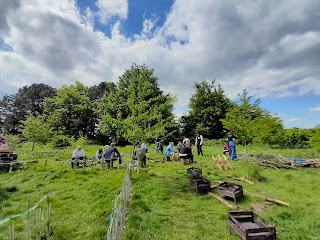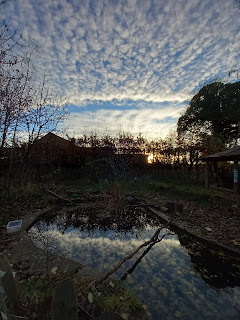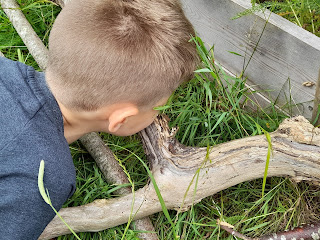Compromise
Chatting to student Forest School Leaders over the last couple of weeks reminded me just how flexible we have to be as practitioners. Supporting the delivery of training meant describing how Forest School should be according to the six principles, and brought home how much compromise many of us make when we work in schools.
Some students have been tasked with setting up a Forest School in their educational setting, some will be taking over existing provision, some will be joining a Forest School 'team', and some lucky folk are setting up independently and can offer full-blown sessions as they see fit!
For most of us, squeezing sessions into a school timetable, ensuring staff have breaks, fitting around staggered lunchtimes, the length of a school afternoon regardless of activity, and not interfering with Maths and English...
AND considering the size of the school, one form entry may allow for all classes to have some kind of long session a week, but two or three (or more) form entry makes that increasingly difficult. Somewhere the decision has to be made to cut the number of classes participating, working out how to ensure all children see SOME sessions across the year, and/or how long they are outside...
AND working with whatever space we have, albeit a corner of a playground, marching off to a local woodland, using a piece of a field, or squeezing into a school garden...
PLUS the age group of children who you will be working with...
Some of this is... irritating.
Sometimes frustrating.
Usually, the compromise gets us through.
However not for everyone. In the case of someone I know it was too much, and she quit to work as an independent FSL.
I don't like all the versions of Forest School we have tried over the last couple of covid ridden years! The pandemic changed the rules for us and finding a path through meant a lot of trial and error. Now, as we struggle back into routine school life, we're considering how that will look moving forward.
We've learned some valuable lessons in the last two years, and we've tried many different approaches. It's been hectic, but always with the children's best interests at heart.
The most important thing is the ethos of children being free to follow their own interests is uppermost. Staying focused on self-motivation, self-esteem, curiosity, choice, freedom, confidence, and progression of skills, has to be the priority and not the National Curriculum, Class Topic, or School Theme.
Sixty minutes of this kind of discovery and investigation is better than two hours of mandatory learning to identify beetles for a minibeast theme, or every child HAVING to produce some Viking Knitting or the class as a whole producing a specific outcome to tick a box in class data!
This independence is what Forest School is all about.
OR, run off their pent up energy, their frustrations, their need to move muscles after sitting for so long, and enjoy some space to just be...
If this is the best way we focus on mental health, physical health, and holistic wellbeing, we can't ignore the ethos in favour of forcing in a little extra curriculum time!
It won't work if every child has to complete a learning intention during a session.
Outdoor Learning is a powerful tool. It's something that enhances what is taught in the classroom and enriches the curriculum for staff and pupils. It's the perfect way to support what is happening inside and to make a lesson memorable. It's great for engaging those children who struggle at a desk, and the very best way to make many subjects more meaningful. It's not, however, Forest School.
Most children move their 'learning' along every time they come outside. It's unlikely they go a day without discovering something new.
Outdoors, they climb a little higher, they see something they didn't see before, they play with someone they don't usually team up with, they get more curious, more social, more confident.
Any repetition consolidates what they knew before, and the ever-changing seasons make change inevitable. It gives the opportunity for their imagination to expand, and their knowledge to extend through talking to adults and peers, through seeing, hearing, touching and experiencing something new.
There is no written aim to achieve, just natural curiosity and the chance to explore.
There are lots of activities I wish I could do with the classes I have. More bushcraft, more cooking, more team games. But as it is frequently 2 adults to almost 30 children the ratios make it almost impossible.
Next Year there will be 3 Forest School Leaders at Chartham. We will all bring our own strengths and interests to our sessions but will be unified in remaining child-led. Hopefully, this approach will extend the opportunities we can offer the classes.
This is exciting, but also daunting as managing it will take some time to master!
So we stride into the Summer Terms, enthusiastic Forest School Leaders to be, excited pupils, and a whole School commitment to taking learning outside in every way possible. The 'what if' plans in our heads for the future of Forest School are numerous and need to be discussed and dissected!
There are a couple of busy months ahead, but looking to the future it's a tantalising swirl of endless possibilities.
There will continue to be compromise, there has to be. Timetables and curriculum demands take a toll, along with staffing and time slots.
But not on pedagogy.










Comments
Post a Comment